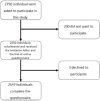How Iranian people perceived the COVID-19 crisis? Explored findings from a qualitative study: current concerns, ethics and global solidarity
- PMID: 34622085
- PMCID: PMC8452290
- DOI: 10.15167/2421-4248/jpmh2021.62.1S3.2117
How Iranian people perceived the COVID-19 crisis? Explored findings from a qualitative study: current concerns, ethics and global solidarity
Abstract
Objectives: This nation-wide project aimed to investigate the common perceptions and concerns regarding COVID-19 outbreak in Iran.
Methods: This qualitative study was conducted in Iran from February to March 2020 via an online open-ended questionnaire. The participants were also selected using convenience and snowball sampling methods. As well, the data collection process continued until data saturation was achieved. Thematic content analysis was utilized to analysis the transcribed texts.
Results: The statements retrieved also represented the most challenging psychological stress experienced by the participants. Four themes were accordingly recognized based on the content analysis including stressful conditions, health concerns, social and political concerns, and economic concerns. Throughout the study, a major proportion of the participants commented that psychological disorders such as fear, anxiety, stress, and ennui were their main challenges regarding this pandemic. Furthermore, lack of social responsibility, worries about high-risk and susceptible groups, decreased economic power of the public, financial hardships for low-income groups, shortage of healthcare facilities, and adverse effects of disinfectants were expressed as the main concerns.
Conclusions: As a whole, it is evident that people have confronted with several challenges and need help together with effective policies and strategies during and after COVID-19 pandemic to reduce their current concerns. The study findings provided a favorable ground to develop and adopt the required policies in Iran and other countries. It was concluded that creating local, national, and global solidarity in such outbreaks is an inevitable necessity.
Conflict of interest statement
Conflict of interest statement The authors declare no conflict of interest.
Figures
Similar articles
-
Stress test: translational research during COVID-19 pandemic.J Cachexia Sarcopenia Muscle. 2020 Dec;11(6):1385-1387. doi: 10.1002/jcsm.12640. Epub 2020 Nov 18. J Cachexia Sarcopenia Muscle. 2020. PMID: 33205893 Free PMC article. No abstract available.
-
Psychological distress during the initial stage of the COVID-19 pandemic in an Italian population living with HIV: an online survey.Infez Med. 2021 Mar 1;29(1):54-64. Infez Med. 2021. PMID: 33664173
-
The COVID-19 outbreak and behavioral changes, public perceptions and psychological responses in Iran.Arch Psychiatr Nurs. 2020 Dec;34(6):458. doi: 10.1016/j.apnu.2020.08.002. Epub 2020 Aug 7. Arch Psychiatr Nurs. 2020. PMID: 33280666 Free PMC article. No abstract available.
-
Mental health and wellbeing of children and adolescents during the covid-19 pandemic.BMJ. 2021 Aug 24;374:n1730. doi: 10.1136/bmj.n1730. BMJ. 2021. PMID: 34429302 Review. No abstract available.
-
COVID-19, crisis, and emotional stress: A biocultural perspective of their impact on growth and development for the next generation.Am J Hum Biol. 2020 Sep;32(5):e23474. doi: 10.1002/ajhb.23474. Epub 2020 Jul 16. Am J Hum Biol. 2020. PMID: 32672890 Free PMC article. Review. No abstract available.
Cited by
-
Online education for prosthetics and orthotics students in the era of COVID-19 pandemic in Iran: challenges, opportunities, and recommendations.BMC Med Educ. 2023 May 16;23(1):342. doi: 10.1186/s12909-023-04339-5. BMC Med Educ. 2023. PMID: 37194002 Free PMC article.
-
Use of an Online Platform to Evaluate the Impact of Social Distancing Measures on Psycho-Physical Well-Being in the COVID-19 Era.Int J Environ Res Public Health. 2022 Jun 2;19(11):6805. doi: 10.3390/ijerph19116805. Int J Environ Res Public Health. 2022. PMID: 35682388 Free PMC article.
-
The impact of the Covid-19 pandemic on outpatient visits for patients with cancer in Iran: an interrupted time series analysis.Arch Public Health. 2025 Jan 6;83(1):1. doi: 10.1186/s13690-024-01482-3. Arch Public Health. 2025. PMID: 39757223 Free PMC article.
References
-
- Takian A, Raoofi A, Kazempour-Ardebili S. COVID-19 battle during the toughest sanctions against Iran. Lancet 2020;395:1035. https://doi.org/10.1016/S0140-6736(20)30668-110.1016/S0140-6736(20)30668-1 - DOI - PMC - PubMed
-
- MacIntyre CR. Global spread of COVID-19 and pandemic potential. Global Biosecurity 2020;1(3).
-
- Memon Z, Qureshi S, Memon BR. Assessing the role of quarantine and isolation as control strategies for COVID-19 outbreak: a case study. Chaos, Solitons & Fractals 2021;144:110655. https://doi.org/10.1016/j.chaos.2021.11065510.1016/j.chaos.2021.110655 - DOI - PMC - PubMed
-
- Moradzadeh R. The challenges and considerations of community-based preparedness at the onset of COVID-19 outbreak in Iran, 2020. South Afr J Epidemiol Infect 2020:1-6. https://doi.org/10.1017/S095026882000078310.1017/S0950268820000783 - DOI - PMC - PubMed
-
- McBride O, Murphy J, Shevlin M, Gibson-Miller J, Hartman TK, Hyland P, Levita L, Mason L, Martinez AP, McKay R. Monitoring the psychological, social, and economic impact of the COVID-19 pandemic in the population: Context, design and conduct of the longitudinal COVID-19 psychological research consortium (C19PRC) study. Int J Methods Psychiatr Res 2021;30:e1861. https://doi.org/10.1002/mpr.186110.1002/mpr.1861 - DOI - PMC - PubMed
MeSH terms
LinkOut - more resources
Full Text Sources
Medical

